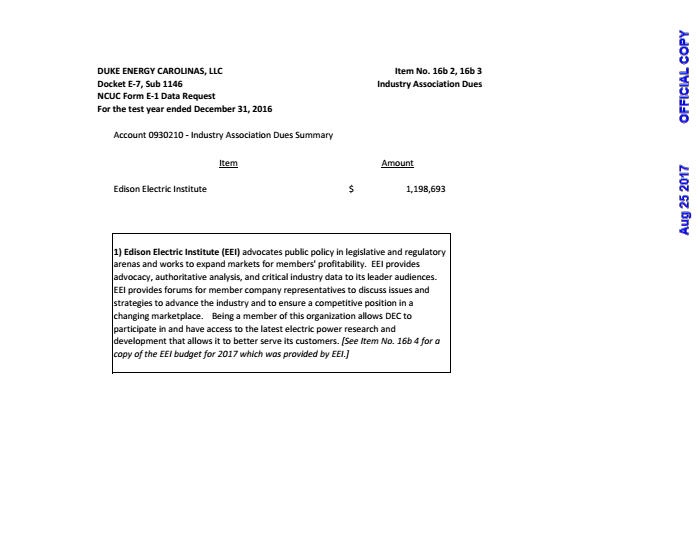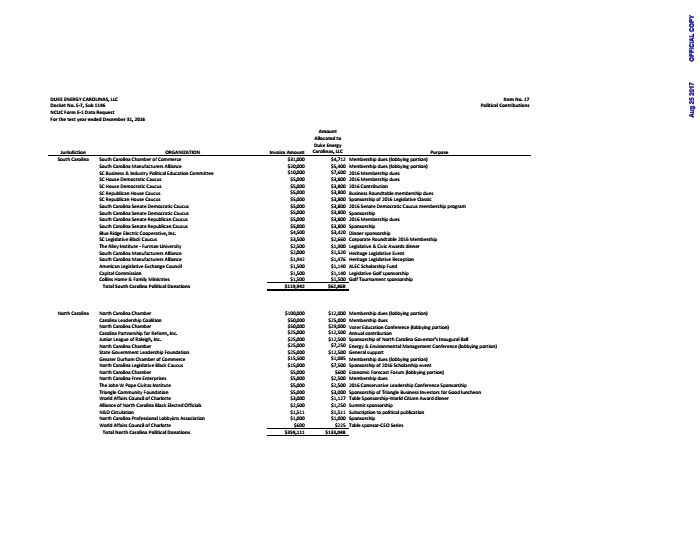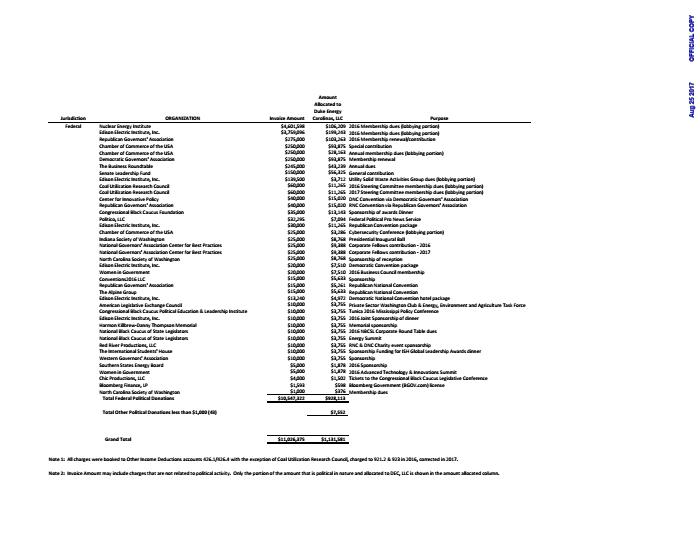Duke Energy’s customers fund groups behind campaigns on coal ash, more
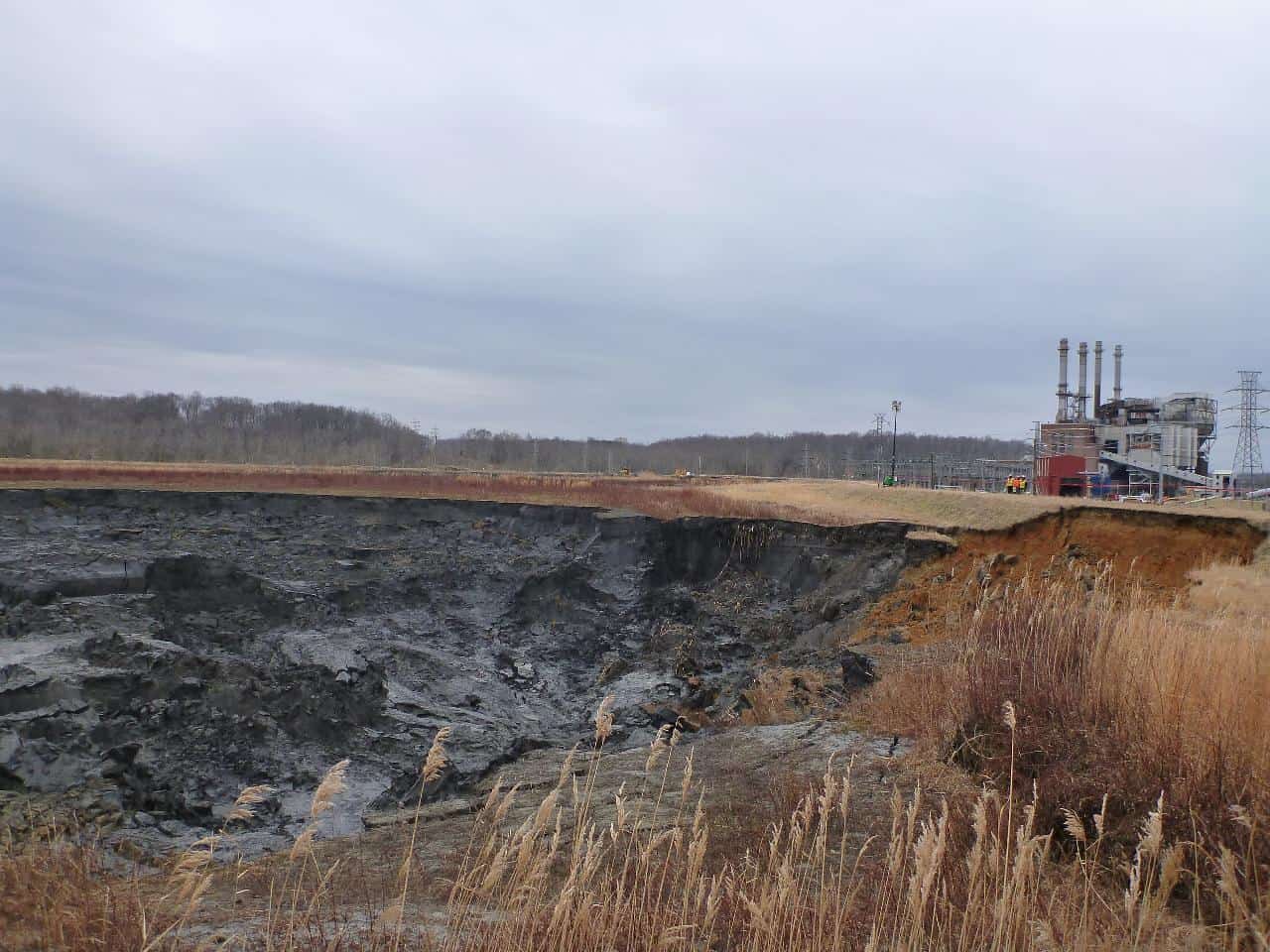
Duke Energy customers in North Carolina pay millions of dollars each year to fund industry groups that have spent years fighting against strong coal ash regulations, and have engaged in a host other efforts that do not benefit consumers.
A 2017 report by the Energy and Policy Institute documented how electric utilities, including Duke Energy, account for the bulk of their dues payments to the Edison Electric Institute (EEI) as expenses that are paid for by their customers.
Since then, documents submitted to the North Carolina Utilities Commission (NCUC) by Duke Energy Carolinas as part of its initial proposal to increase rates by $647 million revealed that customers paid $1,198,693 to EEI in the “test year” of 2016. Without action by the NCUC, customers will continue to be forced to hand over their hard-earned money to EEI, based largely on a black box of redacted information.
The topline message in Duke Energy Carolinas’ justification for including EEI dues in its “cost of service” affirms a key finding of the Energy and Policy Institute’s 2017 report: that EEI is a highly political organization whose efforts largely benefit electric utility shareholders:
A “copy of the EEI budget for 2017” that documented the “annual budget of the association receiving dues from the company by major category of activity” was apparently provided to the NCUC, but information about EEI’s budget was marked “confidential” and redacted when the document was made public:
Duke Energy Progress disclosed another $789,000 in EEI dues paid by its customers in 2016 as part of a separate rate hike request that was just partially approved by the NCUC. Once again, a “copy of the EEI budget for 2017” was redacted when it was made public.
It wasn’t always like this.
“From the 1980s to the early 2000s, NARUC conducted annual audits of trade association financial records through the Committee on Utility Oversight,” as Robert Haberman of the Pace Energy and Climate Center noted in 2017, during testimony before the New York State Public Service Commission.
Haberman’s testimony addressed a similar proposal by a subsidiary of National Grid to “recover electric and gas trade association dues expenses in its proposed rates.”
“The audits persuaded NARUC regulators to direct utilities to collect a smaller portion of their EEI and AGA dues from ratepayers,” Haberman said (AGA = the American Gas Association).
One early example of NARUC’s efforts to audit EEI can be found at the Library of Congress, and totals around 150 pages. However, the last NARUC audit of EEI occurred during the mid-2000s.
“Without transparency of spending data, it is difficult to fully understand how EEI and AGA spend ratepayer funds,” Haberman said.
In other states where this issue of EEI dues has been raised, EEI and its member utilities have argued that the lobbying portion of EEI dues is not paid by utility customers.
Duke Energy Carolinas did disclose some information about the lobbying portions of their EEI dues in “Political Contributions” spreadsheets, but did so in a way that raises more questions.
For example, in one spreadsheet, $199,243 was allocated to Duke Energy Carolinas for “2016 Membership dues (lobbying portion),” but this figure was tied to a larger “Invoice Amount” for $3,759,096.
“Invoice Amount may include charges that are not related to political activity,” the spreadsheet noted, which suggests some portion of those larger amounts may be recoverable from customers.
Additional EEI-related line items from the same “Political Contributions” spreadsheet included:
- $139,500 Invoice Amount with $3,712 allocated for “Utility Solid Waste Activities Group dues (lobbying portion)”
- $20,000 Invoice Amount with $11,265 allocated for “Republican Convention Package”
- $20,000 Invoice Amount with $7,510 allocated for “Democratic Convention Package”
- $13,420 Invoice Amount with $4,972 allocated for “Democratic National Convention hotel package”
- $10,000 Invoice Amount with $3,755 allocated for “Joint Sponsorship of dinner”
A similar political contributions spreadsheet was filed with the NCUC by Duke Energy Progress.
What are customers paying for when Duke Energy hands their money over to EEI?
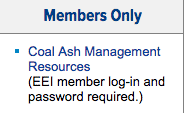 EEI has also argued that its work on issues like cybersecurity and storm recovery benefit consumers, but that is far from the full story. Details about EEI’s work on environmental issues like coal ash and climate change are hidden from public view on password-protected “Members Only” sections of EEI’s website.
EEI has also argued that its work on issues like cybersecurity and storm recovery benefit consumers, but that is far from the full story. Details about EEI’s work on environmental issues like coal ash and climate change are hidden from public view on password-protected “Members Only” sections of EEI’s website.
The New York Times and Washington Post have reported on EEI’s role in the electric utility industry’s national campaign against rooftop solar and net metering.
Internal documents made public on the Energy and Policy Institute’s UtilitySecrets.org site reveal how EEI has provided utilities and regulators with a multi-edition “communications playbook” on how to “win” debates over rate increases and other energy issues.
The playbook recommended that utilities “align yourself with your audience” by stating “You’re committed to providing more clean energy, delivered more reliably and affordably than ever before.”
“Stay future focused,” the playbook also advised.
Duke Energy Carolinas has tried to sell customers on its rate hike using remarkably similar tactics:

The problem, clean energy energy experts say, is that the Duke Energy Carolina’s $13 billion grid modernization plan does not actually include significant investments in technologies like battery storage, electric vehicles, or microgrids that represent the grid of the future.
Meanwhile, Duke Energy wants its customers in North Carolina to pay for the cost of cleaning up its coal ash mess.
Campaigning against strong coal ash regulations
“EEI and USWAG launched a major campaign in 2010 to build support for EPA regulation of coal ash and other coal combustion by-products as non-hazardous waste,” EEI said in 2010. “The campaign focused on direct advocacy; grasstops outreach; collaboration with coalitions and industry partners; and grassroots appeals.”
The electric utility industry claimed victory on this front in 2016, during EEI’s Fall Board and Chief Executives Meeting. The meeting is held each year at the Broadmoor luxury resort in Colorado Springs.
At the event, Duke Energy CEO Lynn Good served as one of the “EEI Board Leads” involved in top-level discussions of EEI and USWAG’s work on “Coal Combustion Residual (CCR) Regulations” and other key environmental issues.
“On April 17, 2015, EPA published the final coal combustion residuals (CCR) rule, regulating CCR as a nonhazardous waste under Subtitle D of the Resource Conservation and Recovery Act (RCRA),” the document said.
“While industry achieved its primary goal—securing Subtitle D, nonhazardous waste regulations—the rule has serious flaws,” it noted.
While EEI and USWAG viewed the designation of coal ash as nonhazardous waste as a victory, public health experts have disagreed and view coal ash a hazardous to human health.
In 2017, a petition by USWAG led the Trump administration to reconsider parts of the Environmental Protection Agency’s coal ash rule.
EEI has engaged in coal-ash related work in North Carolina as well. In 2016, EEI filed an amicus curiae brief in a liability insurance case heard by the NC Court of Appeals. To establish its standing in the case, EEI pointed to the potential liability that its member utilities in North Carolina could face from coal ash. EEI’s members in NC include Duke Energy and Dominion.
Other revelations about Duke Energy’s industry association dues and political contributions
Duke Energy Progress and Duke Energy Carolinas also disclosed millions of dollars in other dues and contributions made in 2016, likely at customers’ expense. Most of that money went to the Institute of Nuclear Power Operations and Nuclear Energy Institute (NEI). In 2017, NEI supported Secretary of Energy Rick Perry’s controversial proposal to bail out failing coal and nuclear power plants.
Duke Energy Carolinas disclosed $7,800 that it paid to the American Coal Ash Association (ACAA), which has also played a role in the electric utility industry’s campaign against strong coal ash regulations. The payments ACAA were included an account used for “fuel” expenses, and were likely paid for by customers.
Other political contributions were also disclosed by Duke Energy Carolinas and Duke Energy Progress.
For example, Duke Energy subsidiaries disclosed $10,000 invoice amounts for the American Legislative Exchange Council (ALEC), with $3,755 allocated to Duke Energy Carolinas and $2,473 to Duke Energy Progress for ALEC’s Private Sector Washington Club and Energy, Environment, and Agriculture Task Force. No clear explanation was provided for the remainder of the invoice amounts. Like EEI, ALEC has helped the electric utility industry in its fight against strong coal ash regulations and rooftop solar power.
The “Political Contributions” spreadsheet filed by Duke Energy Carolinas can be found below:
Limited oversight
In the case of Duke Energy Carolinas, the Public Staff for the NCUC initially “excluded from expenses amounts paid to the U.S. Chamber of Commerce, other chambers of commerce, the NC Chamber Foundation, and political related donations.”
“These expenses should be disallowed because they do not represent actual costs of providing electric service to customers,” according to the Public Staff.
It was not made clear which of these expenses were being disallowed, aside from those for the chambers. EEI was not specifically mentioned in the Public Staff’s adjustments.
Duke Energy Carolinas fought to keep customers on the hook for several hundred thousand dollars in Chamber dues, and the Public Staff agreed to accept the company’s position in their initial partial settlement with the electric utility.
For Duke Energy Progress, the Public Staff took a more limited approach “excluded from expenses amounts paid to the U.S. Chamber of Commerce and other chambers of commerce.”
In this case, the Public Staff’s position prevailed on the question of Chamber dues in the NCUC order that granted Duke Energy Progress part of the rate increase it initially proposed.
It appears that Duke Energy Progress customers will continue to be forced to pay hundreds of thousands dollars each year to EEI, but the issue could still be raised in Duke Energy Carolinas ongoing rate case.

